|
|
| (35 intermediate revisions by the same user not shown) |
| Line 1: |
Line 1: |
| <div style="width:50%;"> | | <div style="width:600px; font-size:20px;"> |
|
| |
|
| = photobook presentation =
| | [[File:Fold-photobook1.jpg|600px]] |
|
| |
|
| == it would have been nice ==
| | ''Fold'' is a book of the human moments surrounding loss, mourning, understanding and catharsis. It consists of twelve open-licensed photos selected from the myriad of images on Flickr. Each image rests in a square, collapsable origami module, with a palette associated with mourning rituals in certain cultures, including white, silver and earth. The photos follow a sequence, indicated by the book cover on the opposite side of each module. When assembled, the cover reads as one strip of folded sediments from a mountain, an image modified from a photo selected from Flickr as well. The book folds into a cuboid measuring 9 x 9 x 4.5cm and is placed in a container with credits of the image sources. |
|
| |
|
| [[File:51U7vxxgIaL. SX378 BO1,204,203,200 .jpg|400px]] | | [[File:Fold-photobook3.jpg|600px]] |
|
| |
|
| I would have liked to present Border Film Project, a book from a larger project[http://www.borderfilmproject.com/en/background/], which I perused at Aeromoto in Mexico City. Unfortunately I couldn't find a copy immediately available in the Netherlands through the Fotomuseum Library's search engine. So, instead, I am going to present the following.
| | [[File:Fold-photobook6.jpg|600px]] |
|
| |
|
| == Holland: Magie van de Werkelijkheid ==
| | How can one respect a book through one's interactions with it? I started the book with this question, which led to my decision for a book structure that allowed the development of a ritual: through (un)folding, opening and closing. Experimenting with ''origami'' (Japanese) and ''zhezhi'' (Chinese), I arrived at the final configuration. The form gave substance to the subject I had in mind: human emotions, whether voluntarily expressed or deliberately hidden. Folding evoked concealment, denial and deception while unfolding: truth, awareness and reconciliation. I focused on the emotion of grief because of my strong personal association with it and the depth of empathy I believed it was capable of elicit. The search terms I used including ''sadness'', ''death'', ''sorrow''. As I looked closely at the results on my screen, I found myself drawn to moments that revealed insight through what was unsaid (and which I regarded as cinematic). One image I encountered early in the process — of a man, holding a baby basket and looking back at the room his family was leaving, and captioned "Last Funeral, vol.2" spoke to me with its intimacy. It influenced my choices for other photos in the sequence. |
|
| |
|
| | [[File:Fold-photobook5.jpg|600px]] |
|
| |
|
| [[File:Screen Shot 2018-11-07 at 17.33.00.png|400px]]
| | {{vimeo|304141499}} pwd is jue's pziwiki username :) |
|
| |
|
| ISBN 90 274 9801 6
| | I envision the book to be a part of an installation-performance. A performer will come on the stage, open the container and unfold the book. She will then invite the audience in line to come up and read the book closely by themselves. Video that creates the sense of a mourning site will be projected in the space. |
|
| |
|
| © 1980 by Het Spectrum B.V.
| | = process notes = |
|
| |
|
| Printed in Italy
| | 1. |
|
| |
|
| Authors:
| | folding and revealing |
| * Toon Fey (photographer)
| |
| * Martin Kers (photographer)
| |
| * Frans Lanting (photographer)
| |
| * Hans Bouma (text)
| |
| * Henk Pen (foreword)
| |
|
| |
|
| === text from the back ===
| | Eikoh Hosoe, '''Kammaitachi''' |
|
| |
|
| Het typisch Hollandse landschap is niet zo nuchter en prozaïsch als het doorgaans lijkt. Bij nader inzien, onder een bepaalde belichting, openbaart het zich als een fascinerende droomwereld, een wereld vol poëzie en mysterie. Een ándere dan de dagelijkse wereld, een visionaire wereld bijna, maar niettemin een wereld, die je herkent. Een wereld, die zich pas nu in al haar geheimzinnige glorie aan je onthult. Goed beschouwd tóch en nog steeds de dagelijkse wereld om je heen. Van die droomachtige en toch ook weer zo reële wereld van het Hollandse landschap willen de fotografen Toon Fey, Martin Kers en Frans Lanting in dit boek een beeld geven. Met korte, poëtische teksten laat Hans Bouma de verbeelding van hun foto's hoorbaar spreken. Met als motto 'Holland, magie van de werkelijkheid' vertelt dit boek het verhaal over een droom van een wereld, die voor de kijker/lezer pure wekelijkheid mag zijn.
| |
|
| |
|
| '''translation'''
| | 2. |
|
| |
|
| The typical Dutch landscape is not as sober and prosaic as it usually seems. On closer inspection, under a certain illumination, it reveals itself as a fascinating dream world, a world full of poetry and mystery. A different than the daily world, a visionary world almost, but nevertheless a world that you recognize. A world that only now reveals itself to you in all its mysterious glory. Well considered and still the daily world around you. The photographers Toon Fey, Martin Kers and Frans Lanting want to give a picture of that dreamlike and yet real world of the Dutch landscape in this book. With short, poetic texts Hans Bouma lets the imagination of their photos be heard audibly. With the motto 'Holland, magic of reality', this book tells the story of a dream of a world that may be pure reality for the viewer / reader.
| | folding as an action -- ritual |
|
| |
|
| === foreword/vormgeving ===
| | folding as a metaphor -- layers, deception, unawareness -- unfolding truth |
|
| |
|
| Dit nogal uitzonderlijke fotoboek is gebaseerd op het werk van drie jeugdige Nederlandse landschapsfotografen: Toon Fey, Martin Kers en Frans Lanting, de zich allen gespecialiseerd hebben in het fotografisch vastleggen van het Hollandse polderlandschap. Door gebruik te maken van ongewone weersomstandigheden (nevel, mist, regen, zeer laat of zeer vroeg licht), ongebruikelijke standplaatsen en technische hulpmiddelen (tele- en groothoeklenzen, technisch verouderde optiek in combinatie met moderne camera's, geforceerd filmmateriaal) slagen zij erin op dat polderlandschap een persoonlijke visie te geven, die zowel verrassend als vervreemdend werkt: het kost de beschouwer van hun kunst enige moeite in deze opnamen het Hollandse landshap, zoals hij zich dat uit eigen waarneming herinnert, te herkennen. Over vrijwel al deze foto's hangt een sfeer die dicht aanleunt tegen het magisch realisme van schilders als Carel Willink, Paul Delveaux, Pyke Koch en anderen, alsook van auteurs als de Vlaming Hubert Lampo. Opmerkelijk is ook, dat drie fotografen die tot voor kort geen enkel contact met elkaar hadden, op vrijwel dezelfde wijze het landschap hebben benaderd en gezocht hebben naar wegen om die benadering te visualiseren: een bewijs wellicht dat deze magisch-realistische opvatting in de lucht hing. Waarschijnlijk sluit hun fotografische visie aan op een veel algemenere hang naar een al dan niet vermeende werkelijkheid áchter de werkelijkheid. Wat dit fotoboek toont is 'het Hollandse landschap dat zich openbaart als een fascinerende droomwereld, een wereld vol poëzie en mysterie. Een andere dan de dagelijkse wereld, een visionaire wereld bijna, maar niettemin een wereld die je herkent. Een wereld die zich nu pas in al haar geheimzinnige glorie aan je onthult'. Het citaat is van de Utrechtse dichter-dominee Hans Bouma die voor dit bijzondere fotoboek de fijnzinnig-poëtische teksten heeft verzorgd.
| |
|
| |
|
| '''translation (highlights are mine)'''
| | 3. |
|
| |
|
| This rather exceptional photo book is based on the work of three young Dutch landscape photographers: Toon Fey, Martin Kers and Frans Lanting, all of whom have specialized in the photographic recording of the Dutch polder landscape. By <span style="background: #fd0;">using unusual weather conditions (mist, fog, rain, very late or very early light), unusual locations and technical aids (telephoto and wide-angle lenses, technically outdated optics in combination with modern cameras, forced film material) they succeed in polder landscape to give a personal vision</span>, which both surprisingly and alienating works: it takes the viewer of their art some effort in these shots to recognize the Dutch landscape, as he recalls from his own observation. Almost all of these photographs have an atmosphere that is close to the magical realism of painters such as <span style="background:#fd0;">Carel Willink, Paul Delveaux, Pyke Koch and others, as well as authors such as Fleming Hubert Lampo</span>. It is also remarkable that three photographers, who until recently had no contact with each other, approached the landscape in much the same way and searched for ways to visualize that approach: a proof that this magical-realistic view might have been in the air . Their photographic vision probably connects with a much more general tendency towards a reality, whether or not imagined, behind reality. What this photo book shows is' the Dutch landscape that reveals itself as a fascinating dream world, a world full of poetry and mystery. A world other than the daily world, almost a visionary world, but nevertheless a world that you recognize. A world that is now revealing itself to you in all its mysterious glory. " The quotation is from the Utrecht poet-reverend Hans Bouma who has created the subtle-poetic texts for this special photo book.
| | folding as a form -- origami |
|
| |
|
| === poetic text ===
| | http://origamitutorials.com/origami-chinese-thread-book/ |
|
| |
|
| Selected (see numbering on the stickers)
| |
|
| |
|
| 1.
| | 4. |
|
| |
|
| hoorbaar
| | Chinese?? |
|
| |
|
| wordt er hier geademd
| | esoteric history, thread book in SW China [http://www.sohu.com/a/209785918_698884] |
|
| |
|
| | esoteric history 2, froebelian (what a word) influence of Chinese folding books [http://foldingdidactics.com/history/a-history-of-chinese-paper-folding-books-and-their-froebelian-influence/] |
|
| |
|
| er is van alles op til
| | appropriating forms... |
|
| |
|
| | encounters of the past (whatever that is) through internet... |
|
| |
|
| maar het hoge woord
| | [[File:Fold-process0.jpg|600px]] |
|
| |
|
| moet nog vallen
| | [[File:Fold-process2.jpg|600px]] |
|
| |
|
| | [[FIle:In-the-folding1.jpg|600px]] |
|
| |
|
| ik zwijg
| | = photobook presentation 13/11= |
| | |
| | See [[Jujube/holland-photobook-notes| this page]] |
|
| |
|
| houd mij adem in
| |
|
| |
|
| </div> | | </div> |
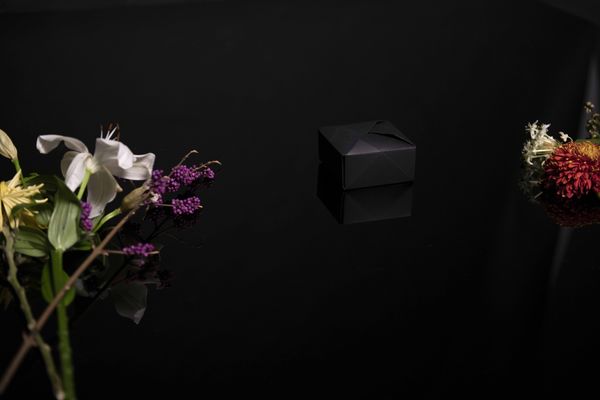
Fold is a book of the human moments surrounding loss, mourning, understanding and catharsis. It consists of twelve open-licensed photos selected from the myriad of images on Flickr. Each image rests in a square, collapsable origami module, with a palette associated with mourning rituals in certain cultures, including white, silver and earth. The photos follow a sequence, indicated by the book cover on the opposite side of each module. When assembled, the cover reads as one strip of folded sediments from a mountain, an image modified from a photo selected from Flickr as well. The book folds into a cuboid measuring 9 x 9 x 4.5cm and is placed in a container with credits of the image sources.
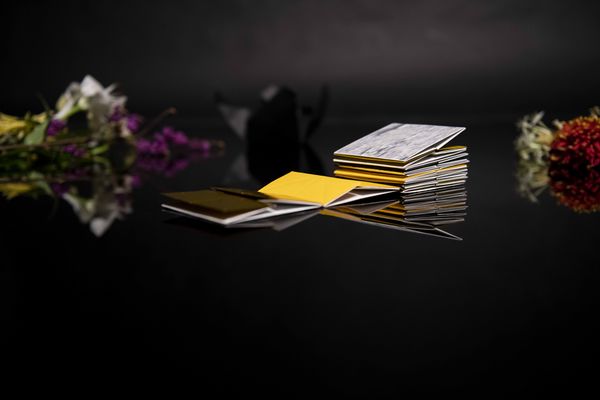
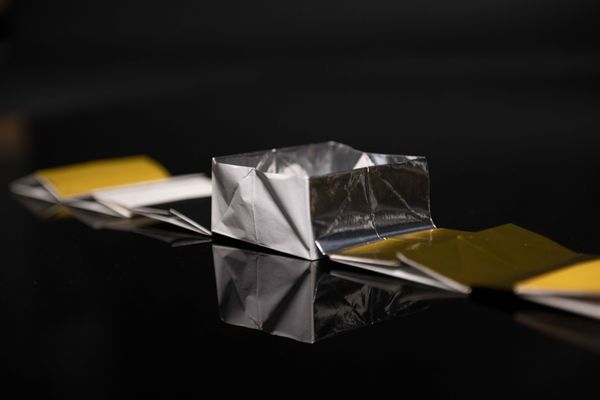
How can one respect a book through one's interactions with it? I started the book with this question, which led to my decision for a book structure that allowed the development of a ritual: through (un)folding, opening and closing. Experimenting with origami (Japanese) and zhezhi (Chinese), I arrived at the final configuration. The form gave substance to the subject I had in mind: human emotions, whether voluntarily expressed or deliberately hidden. Folding evoked concealment, denial and deception while unfolding: truth, awareness and reconciliation. I focused on the emotion of grief because of my strong personal association with it and the depth of empathy I believed it was capable of elicit. The search terms I used including sadness, death, sorrow. As I looked closely at the results on my screen, I found myself drawn to moments that revealed insight through what was unsaid (and which I regarded as cinematic). One image I encountered early in the process — of a man, holding a baby basket and looking back at the room his family was leaving, and captioned "Last Funeral, vol.2" spoke to me with its intimacy. It influenced my choices for other photos in the sequence.
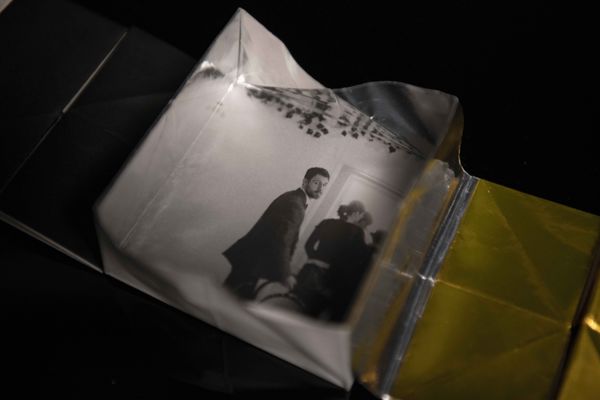
http://vimeo.com/304141499 pwd is jue's pziwiki username :)
I envision the book to be a part of an installation-performance. A performer will come on the stage, open the container and unfold the book. She will then invite the audience in line to come up and read the book closely by themselves. Video that creates the sense of a mourning site will be projected in the space.
process notes
1.
folding and revealing
Eikoh Hosoe, Kammaitachi
2.
folding as an action -- ritual
folding as a metaphor -- layers, deception, unawareness -- unfolding truth
3.
folding as a form -- origami
http://origamitutorials.com/origami-chinese-thread-book/
4.
Chinese??
esoteric history, thread book in SW China [1]
esoteric history 2, froebelian (what a word) influence of Chinese folding books [2]
appropriating forms...
encounters of the past (whatever that is) through internet...
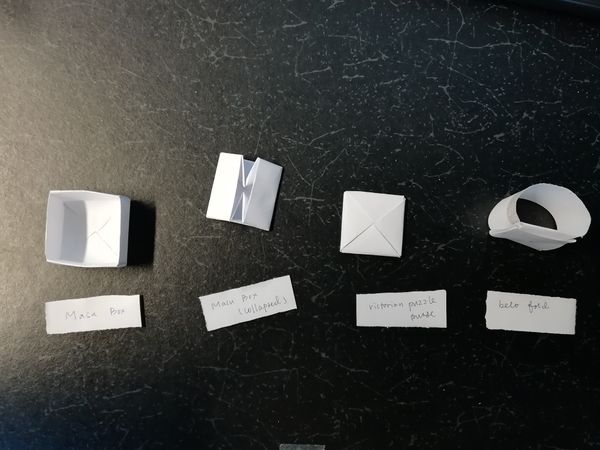
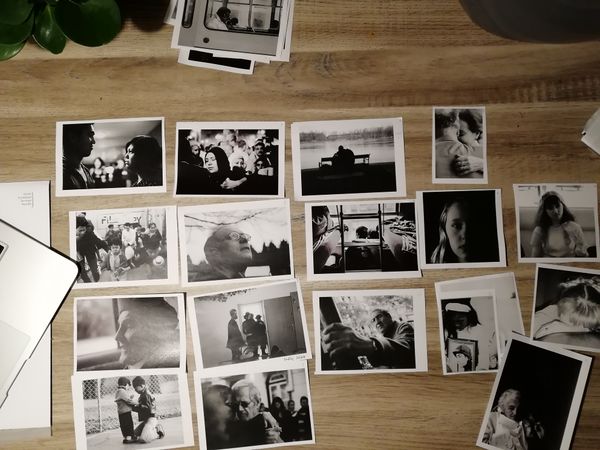
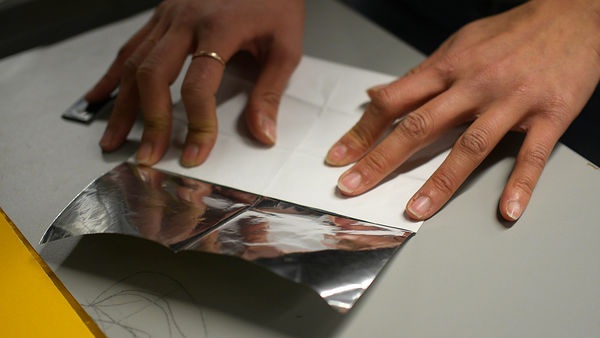
photobook presentation 13/11
See this page







